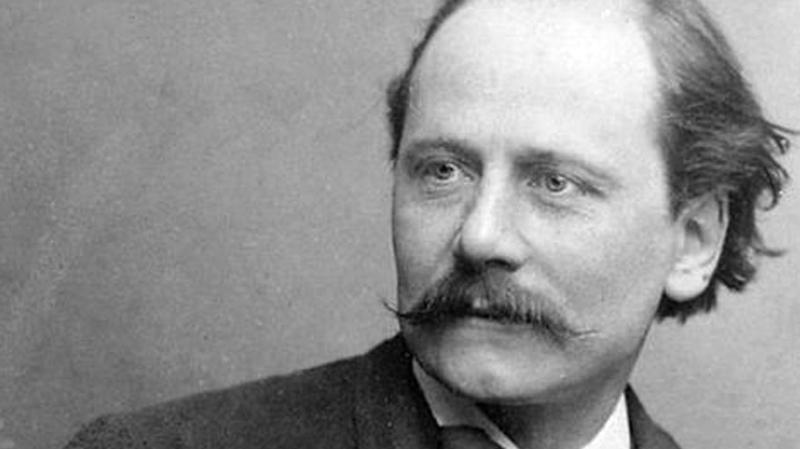|
SATURDEE OPRY LINKS 71:
Massenet Edition

Jules Massenet
Saturdee Opry Links Overture!
Verdi: Un Giorno di Regno
https://www.youtube.com/watch?v=0NTesCwdXkI

Barbara Smith Conrad
Today's SOL is dedicated to the memory of
Barbara Smith Conrad, who passed in 2017 at age 80. As a nineteen-year-old
sophomore at the University of Texas, she was removed from the cast of a
university production of Gluck's "Dido and Aeneas" because she was black. She
became a national cause celebre, championed by Harry Belafonte, Eleanor
Roosevelt and others. She remained at the school, completed her bachelor's
degree, and went on to sing at the New York City Opera and the Met. Here is a
clip from a documentary about her life, "When I Rise."
https://www.youtube.com/watch?v=O6k89Ox-Rtg
https://en.wikipedia.org/wiki/Barbara_Smith_Conrad
1.
Here is an extraordinary performance of "En fermant les yeux" ("When I close my
eyes") from Massenet's "Manon," sung in German by Fritz Wunderlich. (I listened
to four or five, and this one said, "Post me!")
https://www.youtube.com/watch?v=L2jZztdgrAY
Role: Chevalier Des Grieux, a nobleman, son of Count Des Grieux
Setting: Apartment of Chevalier Des Grieux, Paris, France, 18th century
Synopsis: In order to cheer Manon up, Des Grieux relates to her a dream that he
has had. He has dreamed that someday he will own a house surrounded by beautiful
flowers and singing birds. However, he realizes that his dream was still drear
because it lacks one thing : Manon.
Translation:
DES GRIEUX
When I close my eyes I see far away a modest retreat,
a little cottage lost in the middle of the woods!
Under the quiet shade,
the clear and joyous streams,
in which the leaves are reflected,
sing with the birds!
It's Paradise!
Oh no, everything there is sad and melancholy,
because one thing is missing:
Manon ought to be present!
2.
Leopold Simoneau was a French-Canadian lyric tenor with an especially beautiful
tone, as you will hear. What he lacked in heroic tenor range, he compensated for
with earnest, warm interpretation. There is power in that, too. Here he is with
the titanic aria, "O Souverain" from "Le Cid," by Massenet.
Role : Rodrigue, a knight
Setting : Rodrigue's tent, outside Burgos, Spain, 11th century
Synopsis : Just before a battle against an overwhelming army of Moors, Rodrigue
prays for victory.
https://www.youtube.com/watch?v=hTKyMxJAP7o
Translation:
http://3-tenors.blogspot.com/2011/03/o-souverain-o-juge-o-pere-oh-lord-oh.html
About Simoneau:
http://www.nytimes.com/2006/08/29/arts/music/29simoneau.html
Here for the sake of comparison, is the great Joseph Schmidt, the "Pocket
Caruso," also with "O Souverain" from Massenet's "Le Cid." I could not choose
between the lyric beauty of Simoneau (previous post) and the lyric power of
Schmidt. Both are very moving, need it be said. . .Schmidt sings it here in his
native German. As always, SOL notes the tragedy of Schmidt's life, how he was
prevented from singing in U.S. opera houses because he was under five feet tall,
and how, while touring Europe, he found himself fleeing the Nazis (he was
Jewish) and taking cover in a Swiss refugee camp, where he died of a heart
attack at 38. See previous post for synopsis and translation.
https://www.youtube.com/watch?v=WHdo9YX5xAA
https://en.wikipedia.org/wiki/Joseph_Schmidt
SPOTLIGHT:
Jules Massenet
https://en.wikipedia.org/wiki/Jules_Massenet
3.
Jules Massenet was enormously successful in the late 19th century, with over 40
works for state, including many operas. By the time of his death in 1912, he was
considered old-fashioned, dated, with only the operas, "Werther," and "Manon"
still staged (as they are today.) A shy man, he never once took a curtain call.
Here, tenor Nicolai Gedda sings what is perhaps Massenet's best known tenor
aria, "Pourquoi me Reveiller," ("Why do you awaken me?") from "Werther." I
listened to four or five excellent renditions of this just now. Gedda's was
head-and-shoulders above, and that includes Placido Domingo, Georges Thill,
Ferrucio Tagliavini.
https://www.youtube.com/watch?v=R95MyxjgggE
Role: Werther, a poet, about 23 years old
Setting: the Magistrate's house at Christmas, Frankfurt, Germany, 1780
Synopsis: Werther has come back to see Charlotte, his love who is married to
another man. She shows him some of the books that they used to read together.
One book in particular, a collection of Ossain's verses, sparks Werther to ask
spring to cease its gentle caresses upon him, for sadness and grief is now his
fate.
Translation:
http://www.aria-database.com/translations/werther09a_pourquoi.txt
4.
There was a tradition, even a de facto competition, among late 19th century
opera composers, to write a bit of memorable intermezzo music to go between
scenes---without singing. Massenet's opera, "Thais," is chiefly memorable for
the incidental "Meditation" he wrote, appearing between the scenes of act two.
The strange irony is that this is far and away the most memorable melody and
music in the entire opera! Point being: here, the guy writes a great, beautiful
melody for an opera, but no one sings it! You'd think he might have thought,
hell, that's too good to not make it into an aria. Anyhow, here it is, the
"Meditation" from "Thais."
https://www.youtube.com/watch?v=luL1T1WQC2k
5.
"Manon" is Massenet's most popular and enduring opera, regarded as an example of
the charm and vitality of the music and culture of the Parisian Belle Époque.
(The opera was a mainstay of the Opéra-Comique in Paris, reaching its 1,000th
performance there in 1919, its 1,500th in 1931 and 2,000th in 1952.) Here is an
excerpt from a production updated to what appears to be the 1920's, from some no
doubt profound reason. Anyhow, it's nice and colorful, and has Anna Netrebko,
which compensates for much.
https://www.youtube.com/watch?v=J5kI136uDK8
This is the pleasant trifle, "Je marche sur tous les chemins," which I think
means, "I march through your fur coats."
Role: Manon Lescaut, a young woman, cousin of Lescaut
Setting: A busy square in Paris, France, 18th century
Synopsis: Manon appears in the crowd and tells her admirers about her philosophy
to live only for the moment, caring not what happens afterwards. After all,
there is little time in youth. One should spend it loving, singing, and dancing.
Translation:
MANON
Oh, cousin, please excuse me!
LESCAUT
aside
She's charming!
MANON
I'm still completely dizzy,
I feel numb all over!
Cousin, forgive me!
Excuse an emotional moment!
I'm still totally dizzy!
Please forgive my chattering,
this is the first trip I've ever taken!
The coach had scarcely started to move
when I opened my eyes wide watching
the little villages, the forest, the plain,
the passengers, both young and old.
Cousin, forgive me,
it's the first time I've travelled!
Attentively I saw the trees rush by,
trembling in the wind.
And overwhelmed with delight
I was forgetting that I was leaving for the convent!
Faced with so many new things,
don't laugh when I tell you
that I thought I had wings
and was flying to paradise!
Yes, cousin!
Then, I felt a moment of sadness,
I cried, I don't know what about.
Then the very next minute, I confess
I was laughing, ha, ha, ha, etc.
I was laughing, but without knowing why!
Cousin, excuse me,
cousin, forgive me!
I'm still completely dizzy, etc.
6.
One Massenet’s most famous melodies, “Elegy,” came into being in a roundabout
way: it originated from an unfinished opera, then was used in an Aeschylus
adaptation called "The Erinnyes," then was arranged for cello and orchestra, and
finally was released as a song. It later changed into a jackrabbit and moved to
Arizona. The melody of the “Elegy” has become a standard. (Even Art Tatum once
covered it!).
"O sweet springtimes of old verdant seasons
You have fled forever
I no longer see the blue sky
I no longer hear the bird's joyful singing. . ."
(A song for our time!)
There are so many great renditions on Youtube: Angela Gheorghiu, Caruso,
Chaliapin, Domingo, Jussi Bjorling, and. . .Beniamino Gigli.
https://www.youtube.com/watch?v=BDFrGDSRFY0
Translation:
http://www.lieder.net/lieder/get_text.html?TextId=5863
And here is Angela Gheorghiu, too fine to not post:
https://www.youtube.com/watch?v=G5UKZQRmp8A
Art Tatum!
https://www.youtube.com/watch?v=jc-Svb5mtM0
7.
Sentimental? "Farewell, our little table," sings Manon in Massenet's "Manon."
And yet who has not felt such sentimentality? (Therein lies a clue as to the
appeal of opera.) Anna Netrebko sings with tenderness, poignancy. "Adieu notre
petite table. . ."
Role: Manon Lescaut, a young woman, cousin of Lescaut
Setting: Apartment of Chevalier Des Grieux, Paris, France, 18th century
Synopsis: Manon has been told by a nobleman that her love Des Grieux will soon
be kidnapped by his father's men in order to get him away from her. She knows
that the happy days they have spent in Des Grieux's apartment will soon be at an
end and takes the opportunity to bid adieu to the table at which she and her
love ate many meals together.
https://www.youtube.com/watch?v=KmORAWiXeZ0
Translation:
http://www.aria-database.com/search.php?individualAria=610
8.
After that weeper over a piece of furniture, here is something more breezy---"Du
gai soleil" ("From the gay (old meaning) sun"), from Massenet's "Werther." Nice
production. The soprano is Lisette Oropesa.
https://www.youtube.com/watch?v=vDhmChWwyWk
Role: Sophie, daughter of the Magistrate, Charlotte's sister
Setting: in front of a church, Frankfurt, Germany, 1780
Synopsis: Sophie is in a good mood and tells of her happiness, saying that all
the world is joyful with her.
Translation:
http://www.aria-database.com/search.php?individualAria=652
SPOTLIGHT:
A lesson with Lisette!
https://www.youtube.com/watch?v=wlM_-64hndI
FINAL BOW:
Our all-Massenet edition ends with the fine tenor aria, "Je suis seul. . .Ah!
fuyez, douce image," from "Manon." ("Vanish sweet memory too dear to my heart.")
I think we can all identify with this, eh, kids?
https://www.youtube.com/watch?v=E12bfCTKets
Role: Chevalier Des Grieux, a nobleman, son of Count Des Grieux
Setting: The reception room in St. Sulpice church, France, 18th century
Synopsis: After entering the seminary in order to forget about Manon, Des Grieux
finds that he is unable to forget his love for her. He prays to God to remove
this shadow from his heart.
Translation:
DES GRIEUX
alone
I am alone! At last alone!
It is the supreme moment!
There is nothing more that I want
except the sacred calm that my faith brings me.
Yes, I have sought to place God himself
between the world and me.
Ah! Vanish sweet memory too dear to my heart;
respect a calm won through much suffering,
and remember that if I have tasted of a bitter cup,
my heart could fill it full with the blood it has shed!
Ah! Vanish, vanish, go far from me!
Life itself and sham glory mean nothing to me.
I want only to expel from the depths of my memory...
A cursed name!... this name... which obsesses me, and why?
PORTER OF THE SEMINARY
The service is beginning.
DES GRIEUX
I'm on my way... Heavenly Father!
With Your fire
purify my soul!
and by its light dispel
the shadow that still lurks in the depths of my heart!
Ah! Vanish, sweet memory, too dear to my heart.
Vanish, vanish, go far away from me! etc.
Saturdee Opry Links Encore!
Just because today's edition was not exactly full of chirping birds and blooming
flowers, here's a nice capper. Villazon, Netrebko, and Domingo have a good time
with Lehar's "Dein ist Mein Ganzes Herz." See you next week in a brand new show.
https://www.youtube.com/watch?v=Pa58TdbRGJ4
Translation:
http://www.lieder.net/lieder/get_text.html?TextId=60079
Back to Opera Links
Back to Home Page
|



